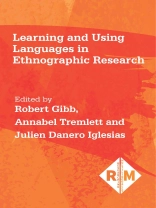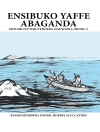Learning and Using Languages in Ethnographic Research breaks the silence that still surrounds learning a language for ethnographic research and in the process demystifies some of the multilingual aspects of contemporary ethnographic work. It does this by offering a set of engaging and accessible accounts of language learning and use written by ethnographers who are at different stages of their academic career. A key theme is how researchers’ experiences of learning and using other languages in fieldwork contexts relate to wider structures of power, hierarchy and inequality. The volume aims to promote a wider debate among researchers about how they themselves learn and use different languages in their work, and to help future fieldworkers make more informed choices when carrying out ethnographic research using other languages.
Cuprins
Chapter 1. Robert Gibb, Annabel Tremlett and Julien Danero Iglesias: Introduction
Chapter 2. Lydia Medland: Language Learning as Research Rehearsal: Preparation for Multi-linguistic Field Research in Morocco
Chapter 3. Susan Frohlick and Carolina Meneses: Emergent Collaborations: Field Assistants, Voice, and Multilingualism
Chapter 4. Laela Adamson: Learning Language to Research Language in Two Tanzanian Secondary Schools
Chapter 5. Robert Gibb: ‘Demystifying’ Multilingual Fieldwork: On the Importance of Documenting and Reflecting on Language Learning in Ethnographic Research
Chapter 6. Dominic Esler: Dealing with Diglossia: Language Learning as Ethnography
Chapter 7. Teresa Piacentini: Language Learning and Unlearning in Ethnographic Fieldwork: ‘Speaking Asylum’ and ‘Doing Small Talk’
Chapter 8. Lara Momesso: One Language, Two Systems: On Conducting Ethnographic Research Across the Taiwan Strait
Chapter 9. Annabel Tremlett: Breakdowns for Breakthroughs: Using Anxiety and Embarrassment as Insightful Points for Understanding Fieldwork
Chapter 10. Daniella Jofré: Andean Ethnography and Language Learning: Reflecting on Identity Politics and Resistance Strategies of the Chilean Aymara
Chapter 11. Julien Danero Iglesias: How I Tried to Speak a Language Like a ‘Native’ and how this Influenced my Research
Chapter 12. Iolanda Vasile: ‘The Language is Mine. The Accent is Yours’: Doing Fieldwork in Angola
Chapter 13. Matthew Blackburn: Being ‘Proficient’ and ‘Competent’: On ‘Languaging’, Field Identity and Power/Privilege Dynamics in Ethnographic Research
Chapter 14. Charo Reyes: Plurilingual Focus, Multilingual Space, Bilingual Set-up: Conducting Ethnographic Research in Two Catalonian Schools
Chapter 15. Wine Tesseur: Listening, Languages and the Nature of Knowledge and Evidence: What We Can Learn from Investigating ‘Listening’ in NGOs
Chapter 16. Sarah Burton: Becoming a Multilingual Researcher in Contemporary Academic Culture: Experiential Stories of (Not) Learning and Using Languages
Chapter 17. Robert Gibb, Annabel Tremlett and Julien Danero Iglesias: Conclusion
Despre autor
Julien Danero Iglesias is Principal Policy and Projects Officer at Camden Council (Housing) and an Affiliate Researcher at the University of Glasgow, UK. His research interests include nationalism, discourse, borders and minorities.












